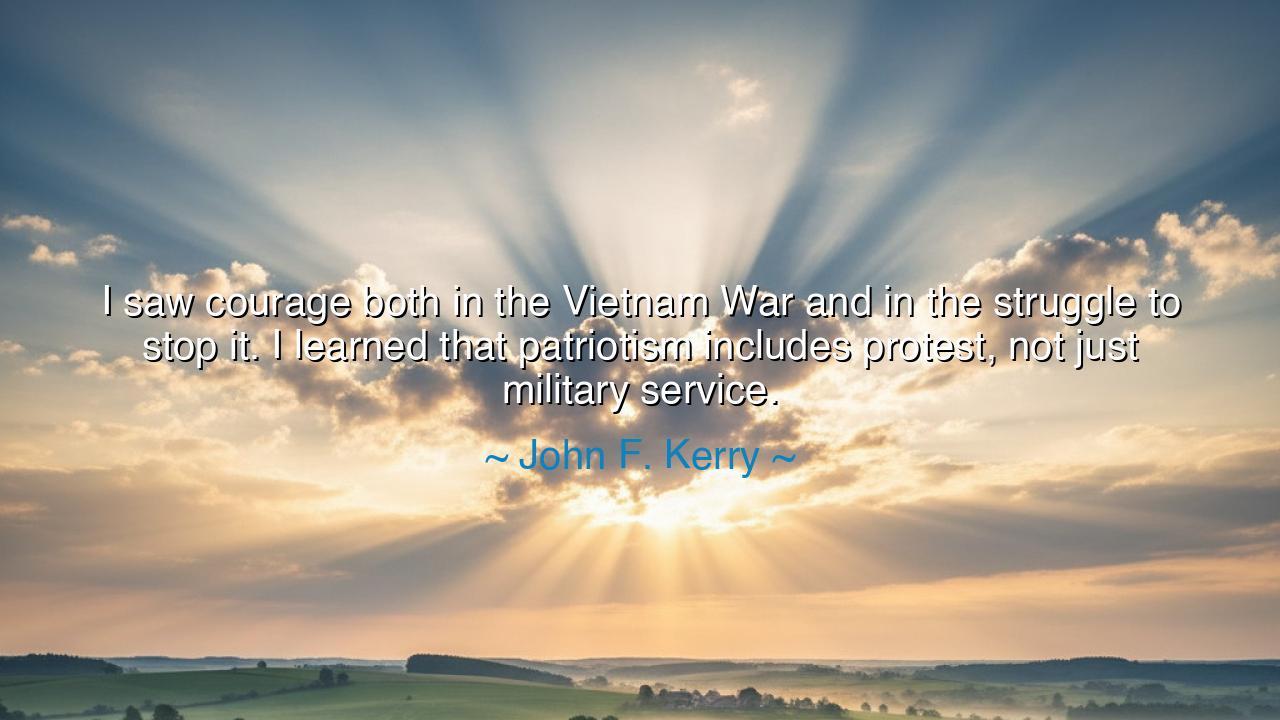
I saw courage both in the Vietnam War and in the struggle to stop
I saw courage both in the Vietnam War and in the struggle to stop it. I learned that patriotism includes protest, not just military service.






The statesman and soldier John F. Kerry, who served in the fires of war and later stood among the ranks of those who opposed it, once spoke these powerful words: “I saw courage both in the Vietnam War and in the struggle to stop it. I learned that patriotism includes protest, not just military service.” In this reflection lies a wisdom that transcends the battlefield and reaches into the soul of every nation—the understanding that patriotism is not blind obedience, but the pursuit of truth and justice even when it challenges power. Kerry, who bore both the uniform of a warrior and the voice of a dissenter, reminds us that courage wears many faces, and that love for one’s country is proved not only in defense of its borders but in defense of its conscience.
To understand the depth of his words, we must look to the world from which they arose. The Vietnam War was a crucible that divided a generation. It was a time when young men were sent to fight in jungles far from home, often for reasons clouded by politics and pride. Kerry himself went to that war, commanding a patrol boat, witnessing both heroism and horror. He saw his comrades display unyielding courage in the face of death, sacrifice that could not be questioned. But when he returned, he saw another kind of courage—that of those who marched in the streets, who lifted their voices against the war, who dared to question the morality of their own government. Both forms of courage, he realized, sprang from the same root: love of country, love of truth.
In this revelation, Kerry bridges two worlds often seen as enemies—the soldier and the protester, the fighter and the reformer. He teaches that patriotism is not a single note, but a harmony of conviction. The soldier defends the nation’s body; the protester defends its soul. When the two are united, a nation is strong; when they are divided, it weakens from within. The courage to fight and the courage to question are both sacred duties. For if a nation cannot face its own mistakes, it becomes a prisoner of them.
History offers many examples of such dual courage. Consider Martin Luther King Jr., who, during that same era, spoke against the Vietnam War with words that shook the conscience of America. He was not a soldier in uniform, but he was a soldier in spirit—risking his life to uphold the higher law of justice. His protest was not against his country, but for it. He sought to awaken the nation to its better self, to remind it that true patriotism demands integrity, not silence. And just as Kerry would later affirm, King’s defiance was an act of loyalty to the ideals written in the nation’s founding promise.
This is the essence of Kerry’s wisdom: that to love one’s country is not to agree with it blindly, but to hold it accountable to its highest values. Courage is not only the willingness to face bullets, but the willingness to face condemnation. The soldier risks his life for freedom; the protester risks his reputation for truth. Both stand upon the same moral ground. A society that honors only the courage of the battlefield and not the courage of the conscience will one day lose both. For when fear silences dissent, corruption takes root, and the spirit of the nation withers.
To live by this truth is to cultivate both honor and empathy. When you see one who fights, do not judge his cause lightly. When you see one who protests, do not question his loyalty too quickly. Seek instead to understand the heart that moves them both. The true patriot listens before he condemns, learns before he labels, and stands for principle even when standing alone. The courage to question is not rebellion—it is renewal. Every great civilization has needed those who dared to speak truth to power, to remind leaders that the flag must serve justice, not pride.
So, my children, remember the lesson of John F. Kerry: “Patriotism includes protest, not just military service.” Be brave enough to fight when the cause is just, but also brave enough to speak when silence would make you complicit. Do not mistake comfort for loyalty, nor obedience for virtue. The highest form of patriotism is born when love of country meets love of truth.
For the destiny of every nation depends not only on the valor of its warriors, but on the conscience of its people. Let your courage be whole—both the courage to defend and the courage to question. And when history calls upon you, may you answer with the same wisdom Kerry found in his journey from the jungles of war to the halls of justice: that the truest service to one’s homeland is not merely to protect its land, but to guard its soul.






AAdministratorAdministrator
Welcome, honored guests. Please leave a comment, we will respond soon